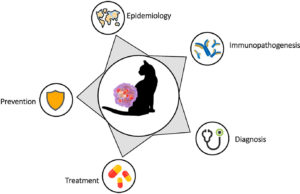- Autores: André Pereira, Carla Maia
- Ano de Publicação: 2021
- Journal: Current Research in Parasitology & Vector-Borne Diseases, Vol 1, 100035
Leishmania infection in cats and feline leishmaniosis: An updated review with a proposal of a diagnosis algorithm and prevention guidelines
Highlights
- A comprehensive review on epidemiology, immunopathogenesis, diagnosis, treatment, and prevention of feline leishmaniosis.
- An algorithm for assisting medical diagnosis of leishmaniosis in cats is suggested.
- Guidelines for the prevention of Leishmania infection in cats are provided.
- Dermatological lesions are the most common clinical manifestations.
- AL increasing treatment failures urges closer immediate follow up of malaria patients
Abstract
Leishmaniosis is a vector-borne disease caused by protozoans of the genus Leishmania, which are transmitted to vertebrates, including cats, through the bites of female phlebotomine sand flies. An increasing number of epidemiological and experimental studies concerning Leishmania infection in cats, as well as case reports of clinical leishmaniosis in these felids, have been published in recent years. In the present study, a comprehensive review was made by sourcing the National Library of Medicine resources to provide updated data on epidemiology, immunopathogenesis, diagnosis, treatment, and prevention of feline leishmaniosis. Cats were found infected with Leishmania parasites worldwide, and feline leishmaniosis appears as an emergent disease mostly reported in countries surrounding the Mediterranean Sea and in Brazil. Cats with impaired immunocompetence seem to have a higher risk to develop clinical disease. The main clinical and clinicopathological findings are dermatological lesions and hypergammaglobulinemia, respectively. Diagnosis of feline leishmaniosis remains a challenge for veterinarians, in part due to the lack of diagnosis support systems. For this reason, a diagnostic algorithm for clinical decision support is herein proposed. No evidence-based treatment protocols are currently available, and these remain empirically based. Control measures are limited and scarce. Thus, a set of prevention guidelines are herein suggested..
Graphical abstract
Keywords
Cats; Diagnosis algorithm; Feline leishmaniosis; Leishmania; Prevention guidelines; Treatment.
Reference
Pereira A., Maia C. (2021) Leishmania infection in cats and feline leishmaniosis: An updated review with a proposal of a diagnosis algorithm and prevention guidelines. Current Research in Parasitology & Vector-Borne Diseases, Volume 1, 2021, 100035.
DOI: https://doi.org/10.1016/j.crpvbd.2021.100035
